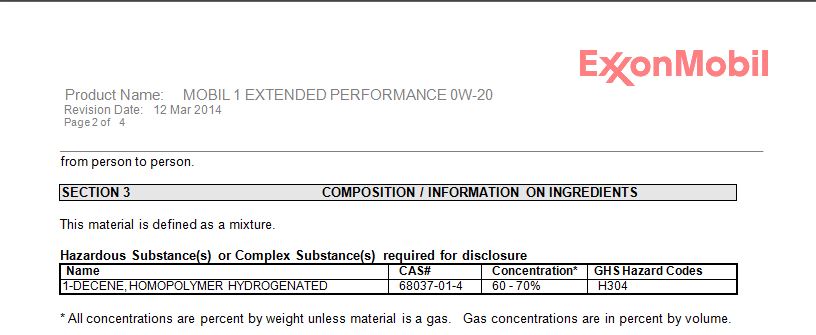Gebo:
The most you can probably learn about these products in terms of what is in them is to take a look at VOA's of them, which will give you an idea as to what metallic additives are in them (but not the organic ones) and the MSDS sheets for them, which may, or may not, tell you a bit about the base oil composition.
A recent M1 0w-40 MSDS listed 50-60% PAO as part of its base oil composition. Similar in appearance to this from the M1 EP 0w-20 PDS:
Which shows 60-70% PAO. You will have to look up the CAS #'s to determine what is what.
Now, keep in mind an MSDS is not a recipe and doesn't really tell you much. They aren't designed for that purpose. But, they do give you at least a little insight as to what might be in the product as far as base oils are concerned.
This is about the most you are going to be able to find out about the two oils in terms of composition. The reason for this is that these formulations are proprietary as has already been pointed out and the companies are under no obligation to divulge how they are formulated.
This is why the sage advice offered by kschachn is indeed valid and that is that the if you are seeking out this information to get an idea as to how they will perform, looking at the approvals, which predicate on performance, is probably your best bet.
If, on the other hand, you have no interest in the performance of the products and you are solely interested in composition, then disregard the talk of the approvals mentioned here and focus on the first part I mentioned. See if you can find some VOA's (finding one for the AMSOIL 0w-40 my be problematic given how new it is) and you can at least compare the metallic additive composition, viscosity....etc.
There ARE a few formulators and industry folks that post here, however none of them have so far posted in your thread. Member lubricatosaurus has posted most of their names above, I would also add Tom NJ and Bruce to the the names he has mentioned. None of these guys as far as I know work for Mobil or AMSOIL however and even if they did, they would be unable to share product formulation details with you. What bobbydevro has shared in the past, and was extremely interesting, was how they tested their product and ran comparative testing with competitor products and how that panned out and the potential value of that kind of testing.
Anyways, this goes back to my earlier point about nobody on here is really going to be able to tell you about how these products are formulated. Only a rough idea as to what is in them via VOA and what they are potentially based with via MSDS is all you are going to find.





